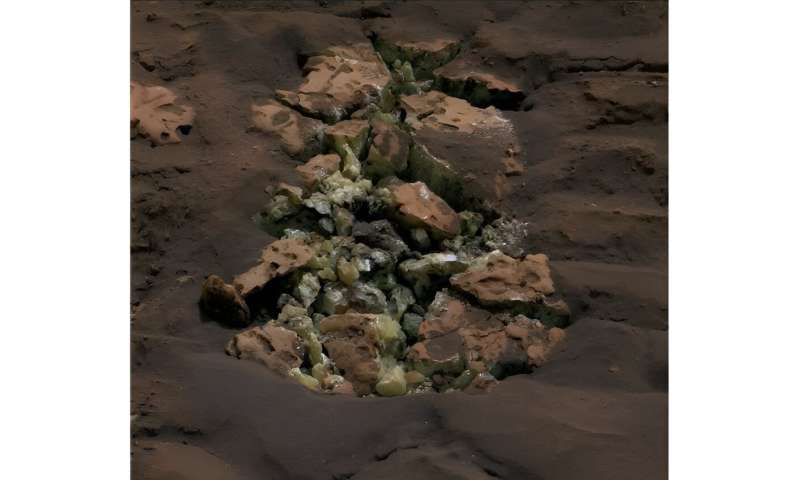Best of Last Week—Pure sulfur on Mars, intuitive robot teleoperation, and Vesuvius discovery

It was a good week for space research, as NASA's Curiosity rover exposed a region of Mars rich with pure sulfur, the first time the element has been seen in its pure form on the planet. Also, while investigating the supermassive black hole believed to be at the center of the Milky Way galaxy (Sagittarius A*), an international team of space researchers uncovered evidence of an intermediate-mass black hole. And a trio of astronomers from North Carolina State University, Yale University and the University of Louisville offered a new explanation regarding the shrinking of the Great Red Spot on Jupiter—they suggest it is mostly due to interactions with smaller wind storms nearby.
In technology news, a combined team of roboticists from the National University of Singapore, Shanghai Jiao Tong University, and Nanjing University developed a new framework that allows robots to learn via online human demonstration videos, opening the door to new opportunities for robot deployment. And another robotics team, this one at the University of California, San Diego, developed a new system that enables intuitive teleoperation of a robotic manipulator in real-time. Called Bunny-VisionPro, the new system allows teleoperation of a robotic system in completing bimanual dexterous manipulation tasks. Also, a team of computer scientists at the Georgia Institute of Technology demonstrated a new neural network that makes decisions similar to those made by a human. And a team of engineers affiliated with several institutions in China developed a flexible, permeable, 3D-integrated electronic skin that combines liquid metal circuits with fibrous substrates. They suggest it could be worn by people as a patient monitoring device.
In other news, a team of medical researchers at the Institute for Systems Biology, in the U.S., found evidence that age, sex and BMI have a major impact on the frequency of bowel movements—they also found that the frequency of bowel movements can have a major influence on physiology and health. And, a combined team of historians from Istituto Nazionale di Geofisica e Vulcanologia and Pompeii Archaeological Park found skeletal evidence at Pompeii suggesting that another natural disaster may have made the famous Vesuvius eruption even more deadly. And finally, a combined team of psychology researchers from Aarhus University, the University of Plymouth and the University of Manchester found evidence that frequent moves during childhood can lead to depression in later life.
© 2024 Science X Network